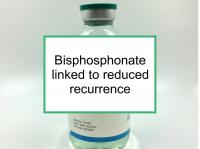New study results published in the New England Journal of Medicine and additional results presented at the current European Multidisciplinary Cancer Congress have reported that the bisphosphonate zoledronic acid may reduce recurrence in postmenopausal women with early stage breast cancer.
Bisphosphonates are used primarily to treat osteoporosis. However, they are also given to breast cancer patients to protect against the effects of bone metastases. The study was designed to investigate whether treatment with zoledronic acid, in addition to standard adjuvant treatment, would improve disease outcomes in women with stage II or stage III breast cancer. Adjuvant treatment takes place after surgery to remove the tumor. Previous reports suggest that the adjuvant use of bisphosphonates might decrease recurrence and death in early stage breast cancer patients.
The study, known as the AZURE trial, started in 2003 and included 3,360 women in the UK, Australia, Spain, Ireland, Portugal, Taiwan and Thailand. Participants were randomly assigned to receive zoledronic acid, or not, in addition to standard adjuvant systemic therapy. The zoledronic acid group received the treatment every three to four weeks for a total of six doses and then every three to six months to complete five years of treatment. The primary endpoint of the study was breast cancer-free survival. The women had been followed for a median of 59 months as of publication.
No significant difference in breast cancer-free survival was found between the two groups overall; both groups had a disease-free survival rate of 77%. Breast cancer recurrence or death occurred in 377 patients in the zoledronic acid group and 375 of those in the no zoledronic acid control group. The number of deaths were also comparable (243 in the zoledronic acid group; 276 in the control group), resulting in overall rates of survival of 85.4% (zoledronic acid group) and 83.1% (control group). There were 17 confirmed cases of osteonecrosis of the jaw and 9 suspected cases in the zoledronic acid group and no cases in the control group. Other adverse side effects had similar rates in the two groups. Treatment effects were independent of estrogen receptor status, tumor stage and degree of lymph node involvement.
Additional analysis presented at the European Multidisciplinary Cancer Congress indicated that among the 1,041 women who had completely passed through menopause (five years since last period), those using zoledronic acid experienced significantly improved relapse-free survival compared to the 2,318 women in all other age groups (premenopausal, perimenopausal, and unknown status). The results also suggest a possible increase in recurrence associated with zoledronic acid use in younger women. Interestingly, non-bone metastasis rates were more strongly influenced by zoledronic acid than bone metastasis rates. This recurrence pattern suggests that bone marrow may be a sanctuary for dormant tumor cells which can be activated after what could amount to many years of dormancy, according to study lead Robert Coleman. These previously dormant tumor cells may then spread via the blood stream to set up metastases at other sites. Zoledronic acid appears to inhibit this process.
In a separate interview, Robert Coleman said “the results have shown that zoledronic acid should not be used routinely for the treatment of early breast cancer. However, for those with low levels of female hormones, due either to natural ageing or specific treatments to induce menopause, the approach appears very promising as more women go on to rid themselves of the disease . . . Our findings could mean a major new treatment approach for the tens of thousands of women in the UK who develop breast cancer. We are now investigating the hormone levels in blood and the biology of the breast tumors in samples donated by the AZURE patients to help us better understand the reasons behind our results.”
